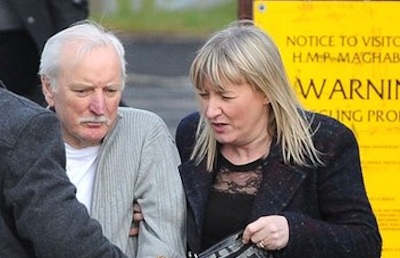
The PSNI have yet to say if they are seeking to question Sinn Fein leader Gerry Adams following the arrest and charging of his former comrade, Ivor Bell, on IRA charges last week.
The 77-year-old war veteran, who left the IRA 29 years ago, received High Court bail this week after being refused by the Magistrates Court where he was charged last Friday. His arrest last week was based on recorded and supposedly ‘confidential’ interviews that he gave to researchers in the USA.
The family of British informer Jean McConville have said they want to see Mr Adams charged alongside Mr Bell in connection with her 1972 shooting.
In court last week, the validity of the interviews -- part of a series of conflict-related archives for Boston College -- was questioned by Mr Bell’s lawyer. Peter Corrigan pointed out that a man codenamed ‘Mr Z’ in the transcripts, who the prosecution claim is his client, had denied involvement in the murder. He said: “Mr Z clearly said in these transcripts: ‘I had nothing to do with Jean McConville’s murder’.”
The lawyer pointed out that Mr Bell suffered from serious health problems, including two heart attacks in 2003 and 2006. He also suffered an angina attack during interrogation at Antrim last week, among other serious medical conditions.
“He has every incentive to attend court to prove his innocence. Are the prosecution seriously suggesting that a man in this serious ill health who can’t walk up steps is going to abscond for an offence where he has every incentive to attend court?,” Mr Corrigan argued.
LEGAL MORASS
Between five and ten years ago, several ex-IRA members made a series of recorded biographies as part of a controversial ‘oral history’ project in which they talked openly about their lives in the armed struggle. Journalist Ed Moloney and former republican prisoner Anthony McIntyre were paid to research and conduct the interviews.
Those interviewed were told none of the details would be made public until after their deaths, although few safeguards were put in place to counter the eventual legal intervention by the British authorities. In 2010, Moloney wrote a well-received book based on the project’s interviews with Brendan ‘The Dark’ Hughes, who died in 2008.
The motivation of both McIntyre and Moloney is a matter of ongoing public debate. McIntyre, a blogger, has said he is opposed to the political direction of Sinn Fein and the Provisional movement, but he has also strongly condemned the breakaway IRA groups.
Sinn Fein has described the Boston College project as a “touters [informers] charter”, and said it was engineered by two people who wre ‘out to get Adams’.
In a statement on Tuesday, Gerry Adams himself described the project as an “entirely bogus, shoddy and self-serving effort” by those involved. He said the idea for the project originated with an advisor to Ulster Unionist leader David Trimble and was taken up by two men who “are vitriolic critics and opponents of the Sinn Fein peace strategy, of me in particular and of Sinn Fein and its leadership.”
In his blog, McIntyre responded that the project “was an important and valuable contribution to Irish history, one that society will be better for having rather than denied”. He said the material was being ‘abused’ by the PSNI and the British State who he said were “intent on prosecuting the past in the absence of any mature politicians willing to come to grips with dealing with the past”.
In his own response, Ed Moloney said he does not “give a tinkers” whether Gerry Adams was ever a member of the IRA, something which the Sinn Fein leader has long denied, to the annoyance of all sides in the conflict.
“When a major political leader tells such an obvious falsehood about a defining part of his life,” Moloney said, “then I do believe that it the journalist’s job, and the historian’s too, to subject that claim to the most stringent scrutiny.
ELECTORAL POLICING
However, the arrest of Bell suggests that it is not Mr Adams, but his opponents, who are the PSNI’s primary targets. Bell was campaign manager for independent republican Ciaran Mulholland, who is standing in local elections in May against Sinn Fein and other nationalist candidates. Mulholland described the arrest as political.
In a recent interview, he said there was more evidence “pointing at other individuals that haven’t even been as much as questioned” in respect of the McConville incident. He pointed to the case of another republican veteran and independent election candidate, Gerry McGeough, who was unexpectedly arrested at an election count centre in County Tyrone in 2007. McGeough was subsequently returned to prison.
“When anyone tries to offer an alternative, give a voice to alternative Republicanism they seem to be either incarcerated, subjected to smear campaigns or just intimidated,” Mulholland said.
He contrasted the situation with those Sinn Fein supporters formerly ‘on the run’ (OTR) who controversially received letters to confirm they are no longer being pursued, such as Donegal man John Downey who was recently cleared of IRA charges at London’s Old Bailey.
“Mr Downey is still very much with the Sinn Fein movement but it seems to be that some people’s rights are more important than other people’s rights,” he said. “And there’s a lack of consistency when it comes to the law depending on what your political aspirations are.”
![[Irish Republican News]](https://republican-news.org/graphics/title_gifs/rn.gif)
![[Irish Republican News]](https://republican-news.org/graphics/title_gifs/harp.gif)

